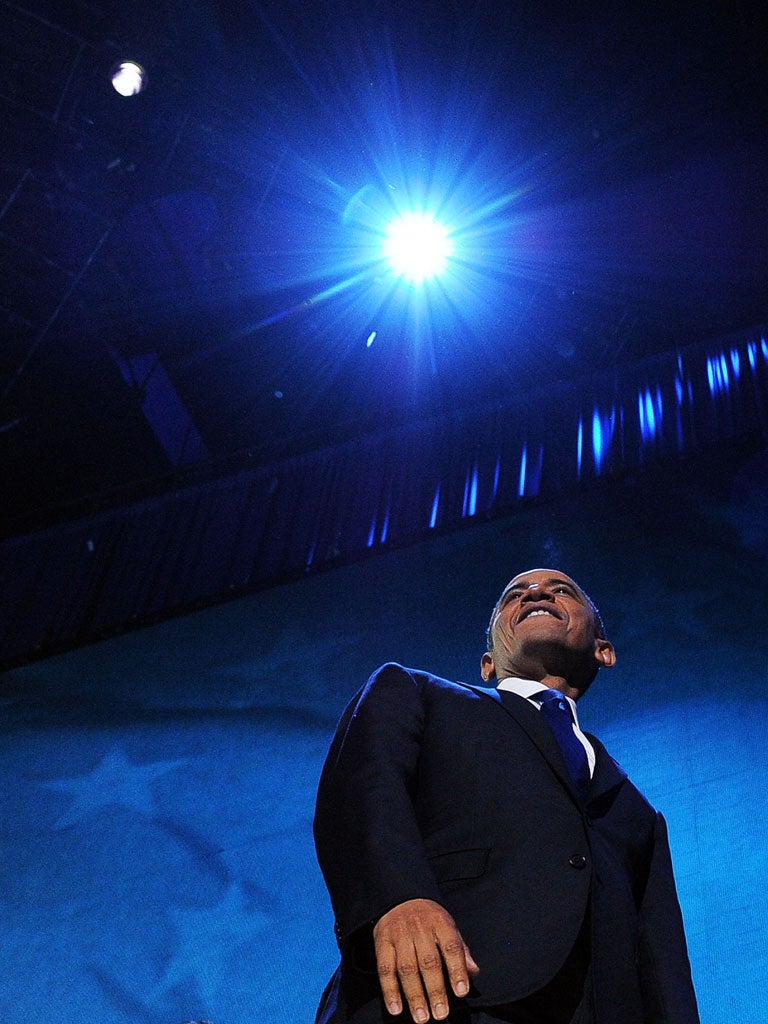A shot at glory: President Obama's second chance
He can use the next four years to tackle some of the US's worst problems – if only the Republicans will let him


Last week was the easy bit, winning an election. Now Barack Obama faces six weeks of brinkmanship with Republicans that could decide whether his second term rounds off one of the great transformative US presidencies – or descends into an acrimonious exercise in futility.
Yesterday, it was almost as if his trouncing of Mitt Romney four days earlier had never happened, as both sides dug in for negotiations over a deficit-reduction deal without which automatic spending cuts and tax increases will kick in at the start of 2013. This so-called "fiscal cliff" would cause the US economy, and perhaps the entire global economy, to plunge into a new recession.
Normally so clear-cut an electoral victory would give the winning incumbent a clear mandate for his policies – in the President's case, the tax increases for those making over $250,000 that were a theme of his campaign. But despite the pressure to rethink policies rejected by the voters, Republicans sound as intransigent as they did throughout Mr Obama's first term. This is despite losing not only the White House last Tuesday but also seats in the Senate of which they hoped to retake control, and in the House of Representatives where their majority has been reduced.
Both sides are calling for compromise. But neither is giving an inch. On Capitol Hill a flurry of backstage contacts is under way between congressional leaders to explore possible areas of agreement. On Friday, however, John Boehner, the House Speaker, said passage of a bill increasing taxes on the rich was "unacceptable", while Mr Obama vowed to veto any bill that failed to do so.
Doors are not yet being slammed, and common ground could yet be found by closing loopholes that benefit the rich, but technically are not tax increases. But even then, Democrats would have to accept a slowdown in the growth of costly entitlement programmes that would upset the party's liberal wing. The price of failure, however, would be higher still.
Second terms are usually low-key affairs. But this one has the potential to be a resplendent exception, with the chance of progress on issues that have bedevilled the country for decades. For the next two years, unencumbered by the need to worry about future elections, Mr Obama will have a rare freedom of action. Only after the 2014 midterms will serious lameduck-itis set in.
The President's first term produced the most sweeping healthcare reform in almost 50 years. Now, if a deficit deal can be struck, setting the country on a stable financial path, other major achievements seem within reach. First among them is immigration reform where, stunned by their dismal performance this week among minorities and Hispanics, Republicans are sounding newly conciliatory. Mr Boehner now says the time is ripe for "comprehensive" reform that would give illegal immigrants and their families a path to citizenship.
With Republicans on the back foot, Mr Obama has an opportunity to take serious action on climate change, an issue avoided in the campaign. He can hone education legislation, and oversee overdue changes to simplify the tax code, and narrow the disparities between rich and poor.
While middle-class earnings have stagnated, the concentration of wealth at the top in the US is greater than at any time since the 1929 crash. Wall Street and superwealthy donors poured vast sums into the Romney campaign, but to no avail. There, too, Mr Obama has a mandate.
The national mood is also improving. More than 40 per cent of Americans say the country is now on the right track: not exactly a ringing endorsement of the status quo, but twice the number of a year ago. An improving economy can only strengthen the President's hand.
The Supreme Court may offer further opportunity. Four of the nine justices are well into their seventies. If one or two retire, Mr Obama will be able to inject young blood into the court's liberal wing.
One problem Mr Obama will not avoid, however: the departure of senior officials and trusted advisers. Hillary Clinton is set to leave in the coming weeks, as are Leon Panetta from the Pentagon and Timothy Geithner from the Treasury.
If his first term is any guide, this President won't get bogged down in scandal, so often the bane of his re-elected predecessors. Watergate finished Richard Nixon, Iran-Contra almost floored Ronald Reagan, and the Monica Lewinsky affair led to Bill Clinton's impeachment.
Possibly the greatest danger lies in Mr Obama's own character. Governing requires immense investment in personal relations, sometimes with political foes. But he is not a schmoozer like Bill Clinton, nor a cajoler/bully like Lyndon Johnson. For the next two years at least, one half of Capitol Hill will be Republican. A decent Boehner/Obama working relationship is essential – more golf anyone?
Mr Obama served only four years in the Senate, two of which he spent on the campaign trail. He is not instinctively attuned to its rhythms and vagaries. The risk is that he tries to stand above the battle, a rational man who assumes reason and common sense will prevail. If the Republicans' scorched-earth tactics of the first term have taught him anything, it's that too often they don't.

Join our commenting forum
Join thought-provoking conversations, follow other Independent readers and see their replies